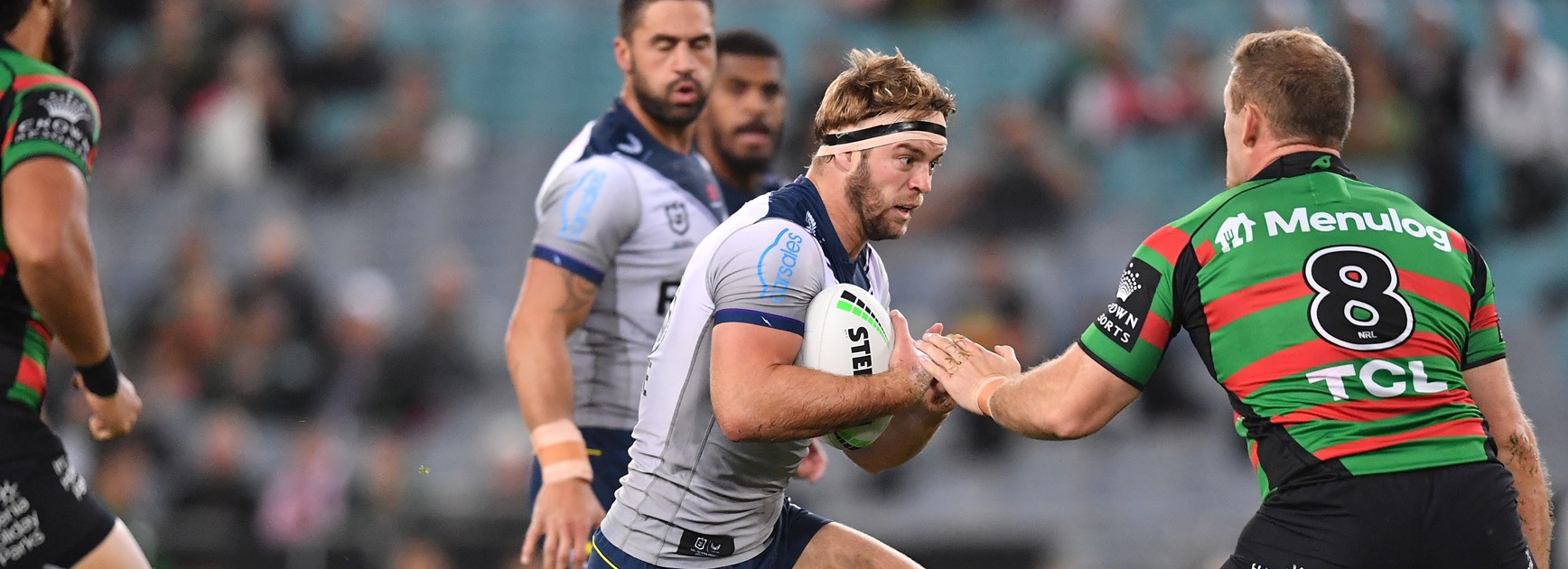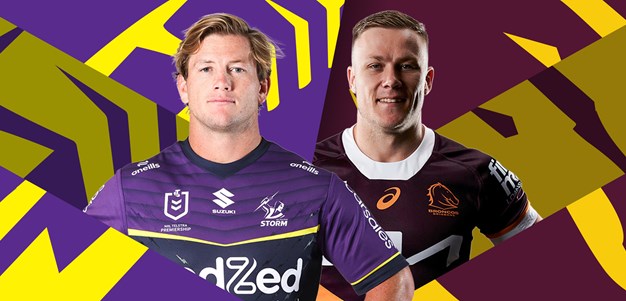
In a busy July, Christian Welch could again lift the State of Origin shield while continuing his preparation for life after footy by crunching numbers for HostPlus.
Welch is set to start a one-day-per-week work placement with the industry super fund - a Melbourne Storm sponsor - a fortnight or so before the potential Origin decider will be played in Sydney.
He will begin working with an accounts team "and then hopefully get a bit of a taste across all the business," the MBA student said.
As the NRL recognises National Careers Week (May 17-23), the three-time Maroons prop is a shining example of the benefits that can come from players offsetting their demanding lives as elite athletes with study or secondary-career pursuits away from the field.
"I've been able to get a bit of theoretical study [through] my short courses and my [commerce] university degree, but I've really found it difficult to find some work experience," Welch told NRL.com.
"It's pretty hard in-season because our weeks are changing so much. I'm looking forward to the schedule ahead and I'll try to pick one day a week I can go in and do a bit of work there.
"I really recommend [having another career interest] because it gives you balance in your life. You're not so weighed down by footy.
"At times it's quite a stressful game to be in. It's very analytical, particularly at the Storm - how much we review our performances, having meetings and how thorough the preparation is. It's really nice to be able to switch off and think about things other than footy."
Tongue delivers Voice Against Violence program to Indie School in Wagga
'Integral components at any club'
Across the NRL, 291 players (including development) are currently completing 340 post-secondary education courses, with the most common university degree being a Bachelor of Business.
Another 50 players either run or own businesses or are currently in paid part-time employment or regular work experience.
It's no small task to balance training and playing duties as well as education or other work commitments. Helping the players walk the beam are club-employed wellbeing and education managers.
There are 34 wellbeing and education managers spread around 16 teams and at least one at each club is a specialist career coach. It's their job to deliver the NRL's CareerWise program and help players figure out their passions and employment pathways.
"They are integral components at every club," NRL career transition and education officer Nicola Skinner said.
"They work from under-16s all the way through to the top 30 in a different capacity depending on the age group. The closer you get to top 30, the more one-to-one direct contact they have to players.
"But the education really does start from 16s in terms of the importance of sticking at school, maintaining your education, planning for life after football and having two dreams. That message starts really young and is then repeated throughout their careers."
Get Caught Up: Magic Round must-see moments
As part of the CareerWise program, it's written into the game's Collective Bargaining Agreement that players are entitled to the equivalent of one day off per week for work or study purposes.
"We've also worked with the NRL in bringing in an under-21s rule where you need to be engaged in some form of study to be playing at the NRL level," RLPA player operations manager Jamie Buhrer said.
"We've got our education grants that the players are entitled to - $3000 per year for NRL, development list and NRLW players."
And all NRL clubs have access to a salary cap-exempt education subsidy up to $15,000 per player every season.
"These are just a number of benefits we encourage players to utilise while they’re playing," said Buhrer, who played 173 NRL games.
"[So hopefully after] a 10-15-year fantastic career, they're well set up to tackle that next chapter ... It gives you a level of comfort. From my perspective, I suffered an ACL injury four, five years into my career.
"Up until that point, I hadn't really taken my studies very seriously and it made me quickly realise that it was important to have a plan."
'Wellbeing is paramount'
Brian Phelan has been Melbourne's player development manager for more than 15 years, working with some of the game's greatest players as the Storm cemented themselves as a powerhouse.
Phelan, who is also the club's career coach, said there several positives from players engaging in external study or work.
"Their wellbeing is paramount," Phelan said.
"No matter how good a footballer you are or how good you are at whatever your job is, if you don't look after your wellbeing, you're not going to flourish and get the best out of yourself.
"[Work and study] is something that has grown within the game in the last five years, I think. That push from all clubs now to have players [engaged in education or another career] is seen as a healthy and productive thing, whereas prior to that there was maybe a view among clubs that it was a bit of a distraction to their footy.
"It's become a realisation across the game more broadly - it's actually encouraged that they have a career away from football, they have balance in their life or are working at their personal development off the field because that will help them from a wellbeing perspective which then translates into a better football performance."
And that's not just an anecdotal comment. Research conducted by Professor David Lavallee of Abertay University in Scotland has shown that NRL players actively preparing for their future are more likely to earn selection for games and have a longer rugby league career.
Arthurs embrace in emotional father-son moment
When Roosters psychologist and career coach Narelle Hess joined the club in 2015, about 20 percent of the top squad was engaged in off-field pursuits. Now that figure "is just over 80 percent," she said.
"There's not really a typical day or week in the life of a career coach at an NRL club. It depends on the time of the year," Hess said.
"During this time of year [mid-season], it's a lot of maintenance of the engagements, supporting the players as they engage in their studies or work shadowing alongside their football.
"If injuries come up, it's working to support them as they are managing those injuries so their studies aren't impacted.
"During pre-season is my busiest time. Before the season starts, it's a lot of one-on-one catch-ups with all of the players to get their ideas set on what they want to do off-field for the year.
"I want to emphasise that it's a lot of work for the NRL athletes to manage studying and/or working while they're playing at NRL level. A lot of credit has to go to those athletes who manage it successfully."
It's not only the seasoned players faced with the not-too-distant prospect of retirement who benefit from career support.
"We know that the statistics for transitioning from a junior representative side into an NRL side is really low," Hess said.
"That's why it was so important for the game to implement programs at such a young age so those athletes can perhaps get a trade behind them before they transition into the NRL.
"And then also if they are not successful in earning an NRL contract, they can be successful in their work-life outside of football."
'A massive shift'
There wasn't much that Chris Lawrence didn't achieve in rugby league, overcoming injury to play 253 NRL matches for the Wests Tigers and represent Australia before retiring last year.
Now the career coach at the Tigers, as well as running the One Wellbeing business that he established in his playing days, Lawrence is passing on his experience to the next generation.
"I used education and study throughout my career as a really good escape from the media attention, something that I wasn't accustomed to getting thrown into the top grade as a 17-year-old," he said.
"I found it was a really good way to take the focus away from football and really help me through the ups and downs.
Retiree reflections: Chris Lawrence
"When we talk about dual-careers and life after sport, one of the things I speak about with Tigers athletes and other athletes is that, yes, this [professional sport] is your No.1 priority. Don't mistake that your No.1 priority is this and you have to be your best self.
"But to get the best out of yourself, you need to have a balanced life, a balanced approach and that actually means taking the focus away from footy when you need to by engaging with study and by continually learning and growing. You can actually get more out of your footy by taking these off-field opportunities."
Since he debuted in 2006, Lawrence said there's been a "massive shift" in the NRL's attitude towards work and study.
One of the NRL's aims this year is to grow the CareerWise program and make work placements like Welch's simpler.
"We could work with our partners like Telstra and Chemist Warehouse and all of our other major partners," Skinner said.
"Just make the process easier for players to access internships or work experience. [Players could intern] even at the NRL. It's a work in progress but that is a commitment."
Welch, who aspires to run a sporting club in retirement, was meant to work with the AFL's St Kilda until COVID-19 intervened.
The 26-year-old front-rower's diligence in seeking out opportunities is born from the fact that football doesn't last forever.
"If you get to 30 in the NRL, that's a great career. Not many guys get there. I think the average [career] is three or four years," Welch said.
"You've got to have an understanding that you're going to be working for a long, long time after you've finished footy and believe that you can prepare for life after footy while also playing at a high level."

